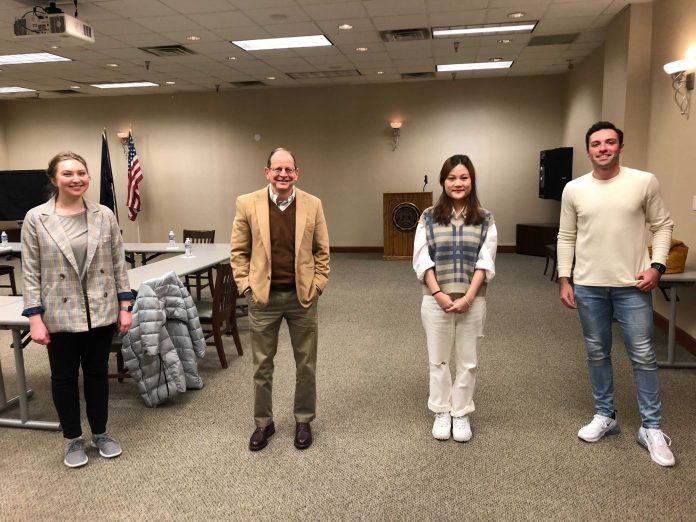
On Thursday, Feb. 10, DePauw welcomed Brookings Institution senior fellow Jonathan Rauch - a long-time author, journalist, and activist, to have a conversation with Dr. Lori White, the university’s president, on freedom of expression. The conversation, titled: “Freedom of Expression: What Does It Mean for Me and for Us at DePauw?”, was both held in Kresge Auditorium and live streamed.
Prior to the conversation, The DePauw, WGRE, and D3TV representatives spoke with Rauch on his career, writing process, political perspectives and advice for DePauw’s students in a liberal arts environment. When he spoke about the motivation and inspiration to write, Rauch said: “Just curiosity. The reason I love journalism is that there is always a question to ask. I just finished a book on where knowledge comes from, and my next project is a piece on nuclear power for The Atlantic. So the only pattern is to stay curious.”
At the beginning of the event, White defined freedom of expression in the international standards as the rights to hold opinions without interference, and included the freedom to seek, receive, and impart information of all kinds, orally, in writing, in print or through any media.
Rauch then responded to White after being asked about his feelings toward freedom of speech in nowadays universities by sharing a story: “I interviewed a lot of people for my books, and I remembered talking to a rising senior at a famous liberal arts college, who said that one of the things she regretted about her campus experience was she had not been exposed to conservative points of view, but she said she did feel some consolation that she had been exposed to a variety of progressive points of view,” he said.
The story was “heartbreaking” but “cringy,” according to Rauch, as he believed that is not what college is supposed to be about. “There is a lot of evidence now that universities are having real problems with lack of viewpoints and diversity, and with active discrimination against people who are conservative including courters, grads students, etc.,” Rauch said.
He also added that diversity must include intellectual diversity and there need to be champions of intellectual diversity on campus who will be just as tough on discrimination against conservatives or Trump’s supporters, as they are against discrimination based on race, gender or sexuality. “Universities should take an audit, and understand where all the problems come from, and then they should make it clear in their values: this is a place that is open to a variety of political and social viewpoints, but they haven’t done that so far,” Rauch said.
Rauch believes that power lies in a university’s president. “All the way down the line, students, who are on the margin of conversations, are debating that this is a heated conversation, but do I want to get involved in that conversation and maybe risk getting slammed?” Rauch said. He believes it’s difficult for students to feel confident about speaking up if they’re unsure if the president will support them. White agreed with Rauch on the role of the president in pushing the freedom of speech forward and educating students about diversity, equity, and inclusion.
In a survey done by Foundation for Individual Rights in Education last year, DePauw was ranked last out of 154 schools regarding freedom of speech on campus. White said, “Many thought that we weren’t supportive of conservative speech on campus; however, if you look at the data, the students who responded to the survey were only about 100 of our entire campus.”
However, she acknowledged and was concerned that there were students in many identity groups who said they didn’t feel like they could show their authentic selves in the survey. According to White, the first step for DePauw now is to articulate the values of freedom of expression, diversity, equity and inclusion, as well as to make sure that everyone at DePauw understands what those values are and commit to living up to them as a part of our community.
She also shared some of the upcoming work to push freedom of speech forward, which includes conversations with students coming this fall about the values of freedom of expression, new curriculum and courses that will be focusing on difficult dialogues, and policy adjustments to align with the articulation of DePauw’s values. Culture change “doesn’t happen overnight,” but she believes all of the upcoming administrative-level plans will demonstrate that DePauw wants to be a model here for freedom of expression.
In the last minutes of the event, Rauch shared his thoughts on the statement of value and the role of students, saying that students are the determinants of universities moving forward.
